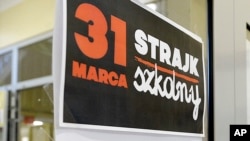Teachers across Poland staged a strike Friday to protest a sweeping overhaul of the education system by the populist government that will see middle schools eliminated this fall. Many fear the change is a pretext for introducing a more nationalistic and old-fashioned curriculum which will leave children less prepared for the modern world.
The education overhaul has become a flashpoint between the ruling Law and Justice party, led by Jaroslaw Kaczynski, and liberal opponents who accuse the powerful party chief of moving the country in an authoritarian direction.
The key change involves eliminating middle schools and returning to a pre-1999 system of eight years of primary school followed by either high school or vocational school.
Many parents kept their children home in solidarity with the teachers and to show their disapproval of the changes, which in some cases will force middle school children to return to elementary schools.
Teachers appeared at work but just sat around or chatted. At one Warsaw school visited by The Associated Press only 23 of 580 pupils showed up. They were supervised by a nun and other employees but received no lessons, passing the day playing, drawing or watching cartoons.
The government says the current system isn't working well and that children will feel more secure remaining longer in primary schools.
Opponents say that everyone is used to the new system now, that it has proven effective and that the changes will produce chaos. They fear the changes are part of an attempt to create a generation of Poles supportive of the ruling party's conservative worldview.
The striking teachers also demanded pay hikes as compensation for their extra work in making the transition.
The Union of Polish Teachers, which organized the strike, said 37 percent of schools nationwide participated. Union leader Slawomir Broniarz said more wanted to join but teachers faced political pressure from "the authorities, superintendents and pro-government labor unions.''
Poland's Education Ministry press office denied that allegation, but otherwise pointed to a statement on its website as its official comment. The statement said the changes, recently passed by parliament, are now a "reality"that must be accepted to ensure the well-being of children. The ministry promised that no teachers will lose their jobs.
In central Warsaw, it was clear the strike had the support of some schools which weren't formally on strike. There were schools working normally with posters plastered on the entrances saying "we support the strike.''
Authorities haven't revealed all specifics of the curriculum overhaul, but teachers say they have been told that more time will be devoted to history and Polish and less to science, computer science and foreign languages.
Joanna Kowalska, an English teacher at a middle school who lost a day's wages to take part in the strike, said the changes were made too fast and without input from teachers.
"I think that this is happening too fast,"said Kowalska, 36, who spoke in an empty classroom. "They are not well prepared, and the teachers are not ready.''




